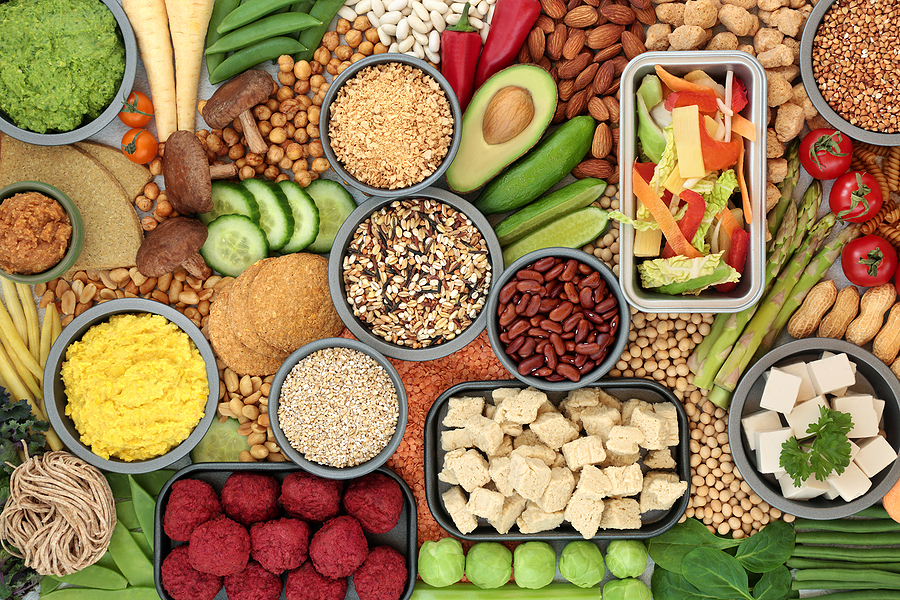Everything About Healthy Food: Benefits of Checking Out Plant Based Alternatives
The conversation bordering plant-based diet plans has gotten significant interest over the last few years. Numerous people are checking out the potential health advantages, nutritional advantages, and environmental effects connected with these dietary selections. As people come to be much more mindful of their food's impact on wellness and sustainability, questions emerge regarding the functionalities of adopting such a way of living. What particular modifications can one anticipate, and just how might these options reshape not only individual health but additionally the earth's future?
Comprehending Plant-Based Diets
Although many individuals associate plant-based diets mostly with vegetarianism or veganism, these diets can incorporate a wide array of eating patterns that focus on entire, minimally refined plant foods. Such diet regimens typically include fruits, veggies, whole grains, seeds, nuts, and vegetables, while eliminating or limiting pet items. This versatility enables people to customize their dietary selections according to nutritional requirements and individual preferences. Some may take on a largely plant-based diet while still sometimes consuming meat or dairy, commonly described as a flexitarian technique. The focus remains on incorporating even more plant foods, which can bring about a varied variety of dishes and flavors. Understanding these various interpretations of plant-based consuming is necessary for appreciating its ease of access and charm in contemporary food society.
Health Perks of Plant-Based Foods
The health and wellness advantages of plant-based foods are significant, providing a nutrient density benefit that supports overall health. Study suggests that these foods can improve heart health and play a crucial role in efficient weight administration. By including more plant-based alternatives, people may boost their nutritional choices and promote lasting health.
Nutrient Thickness Advantage
Nutrient density plays a vital role in the wellness advantages of plant-based foods, making them an engaging option for those looking for a balanced diet regimen. Plant-based foods, such as fruits, vegetables, vegetables, nuts, and entire grains, are typically rich in crucial vitamins, minerals, and anti-oxidants while being lower in calories. This high nutrient density permits people to eat fewer calories while still meeting their nutritional needs. Furthermore, these foods are packed with dietary fiber, promoting digestion health and assisting in weight monitoring. By integrating nutrient-dense plant-based options, customers can boost their total health and wellness, sustain their body immune systems, and lower the threat of persistent diseases. Eventually, the nutrient density of plant-based foods underscores their significance in a health-conscious way of life.
Heart Health And Wellness Renovation

Weight Management Support
Along with promoting heart wellness, a plant-based diet plan can considerably aid in weight administration. This dietary strategy stresses whole foods such as fruits, veggies, beans, nuts, and whole grains, which are typically reduced in calories and greater in fiber compared to animal-based items. The high fiber material aids boost satiation, lowering overall calorie intake. In addition, plant-based diet regimens are frequently rich in necessary nutrients while reduced in harmful fats, making it simpler to preserve a healthy weight. Gluten Free BBQ Sauce. Research shows that individuals that adopt a plant-based way of living have a tendency to have reduced body mass indexes (BMIs) and experience even more effective fat burning contrasted to those who eat meat-heavy diet regimens. As a result, welcoming plant-based options is a calculated choice for efficient weight management
Nutritional Worth of Plant-Based Active Ingredients
Plant-based components are abundant in important nutrients, using a diverse range of vitamins, minerals, and antioxidants that add to overall health and wellness. A contrast of healthy protein resources reveals that while pet items are commonly deemed remarkable, several plant-based options offer appropriate protein and other advantageous substances. Understanding the nutritional worth of these active ingredients can assist individuals make notified nutritional options.
Crucial Nutrients in Plants
Nutrient-rich ingredients located in plants provide a varied array of essential vitamins and minerals that contribute substantially to overall health and wellness. These components are abundant in vitamins A, C, and K, which sustain immune feature, vision, and blood clotting, specifically. In enhancement, plants offer important minerals such as potassium, calcium, and magnesium, crucial for heart wellness, muscle feature, and bone stamina. The visibility of fiber in plant-based foods aids digestion and promotes a healthy and balanced intestine microbiome. Anti-oxidants, located perfectly in veggies and fruits, help combat oxidative stress and lower inflammation. Furthermore, numerous plant foods are low in calories yet high in nutrients, making them an outstanding choice for those seeking to keep a healthy and balanced weight while making sure suitable nutrient consumption.
Comparing Protein Resources
Protein resources vary substantially in their dietary profiles, with plant-based ingredients using unique benefits. Unlike animal healthy proteins, which frequently have saturated fats and cholesterol, plant healthy proteins have a tendency to be lower in these undesirable components. Legumes, nuts, seeds, and whole grains are rich in essential amino acids, fiber, vitamins, and minerals. Lentils give high protein web content together with substantial iron and folate, while quinoa is a total healthy protein, offering all 9 important amino acids. In addition, plant-based proteins are often gone along with by anti-oxidants and phytochemicals that sustain overall health and wellness. The change to plant-based healthy protein sources not only enhances dietary consumption yet also lines up with sustainable nutritional techniques, decreasing environmental influence and promoting long-lasting health benefits.
Environmental Impact of Plant-Based Eating
As recognition of environment adjustment grows, several individuals are checking out sustainable dietary selections that can considerably lessen their ecological impact. Plant-based eating has arised as a significant contributor to decreasing greenhouse gas discharges, which are mainly related to livestock informative post manufacturing. The farming of fruits, grains, vegetables, and vegetables commonly requires fewer resources, such as water and land, contrasted to pet farming. In addition, plant-based diet regimens can result in decreased logging, as much less land is required for grazing animals or growing pet feed. By moving towards plant-based alternatives, consumers can sustain biodiversity and advertise much healthier ecosystems. On the whole, embracing plant-based eating not only advantages personal wellness yet likewise stands for an important step towards ecological sustainability and conservation efforts.
Conquering Common Misconceptions
While many individuals identify the benefits of a plant-based diet plan, a number of misconceptions commonly prevent them from fully embracing this way of life. A common idea is that plant-based diet regimens lack sufficient healthy protein; nevertheless, countless plant resources, such as vegetables, nuts, and tofu, provide adequate protein. Additionally, some think that this diet plan is costly, when in reality, staples like beans, rice, and seasonal vegetables can be quite budget-friendly. An additional misconception is that plant-based consuming is overly limiting, whereas it actually uses a diverse variety of tastes and foods. Finally, several stress that a plant-based diet regimen might lead to shortages, yet with correct preparation, individuals can obtain all needed nutrients, consisting of nutrients, while enjoying a variety of delicious dishes.
Tips for Transitioning to a Plant-Based Way of life
Making the shift to a plant-based lifestyle can be an enriching experience, though it usually needs some guidance to navigate the first modifications. People are urged to start progressively, integrating even more fruits, veggies, legumes, and entire grains into their meals while reducing meat and milk usage. Meal preparation is necessary; preparing a weekly food selection can help alleviate the change and stop last-minute unhealthy options. Discovering cooking methods and new recipes can also maintain and enhance the experience exhilaration regarding plant-based consuming. Furthermore, joining support system or neighborhoods can give motivation and share valuable suggestions. Ultimately, staying educated about nourishment assurances balanced meals, stopping deficiencies while promoting a healthy, gratifying plant-based way of living.
Delicious Plant-Based Dish Ideas
Exploring tasty plant-based dish ideas can motivate individuals to welcome a more healthy diet. One preferred option is a hearty quinoa salad, including cherry tomatoes, cucumber, and a tangy lemon-tahini clothing. Another fave is a mouthwatering lentil stew, loaded with carrots, celery, and aromatic natural herbs, excellent for a comforting dinner. For morning meal, over night oats made with almond milk, chia seeds, and topped with fresh berries offer a healthy start to the day. In addition, a vivid veggie stir-fry with tofu and a selection of colorful veggies can be a quick yet resource pleasing dish. Luscious avocado Find Out More salute on whole-grain bread, sprinkled with seeds and seasonings, supplies a simple yet flavorful snack. These dishes display the selection and splendor of plant-based consuming.

Frequently Asked Inquiries
Can a Plant-Based Diet Offer Enough Healthy Protein?
The inquiry of whether a plant-based diet can supply adequate healthy protein is common. Many sources, consisting of legumes, nuts, seeds, and whole grains, can satisfy protein requires effectively, supporting a healthy and balanced diet plan for individuals.
Are Plant-Based Diets Appropriate for Children?
The suitability of plant-based diet regimens for kids depends on careful planning. Sufficient nutrients need to be guaranteed, consisting of minerals, proteins, and vitamins. With proper guidance, such diets can sustain healthy development and growth in children.
How Do I Eat Out on a Plant-Based Diet?
Eating in restaurants on a plant-based diet plan entails seeking dining establishments with diverse food selections, asking for alterations, and discovering vegan-friendly options. Preparation in advance and communicating dietary preferences can improve the eating experience while maintaining nutritional options.
What Are Typical Allergens in Plant-Based Foods?
Typical irritants in plant-based foods consist of soy, gluten, nuts, and seeds - BBQ Sauces. People following a plant-based diet should recognize these allergens and read labels carefully to avoid damaging reactions and assure risk-free intake
Can Plant-Based Diets Assist With Fat Burning?
Study shows that taking on a plant-based diet plan may promote weight management as a result of its typically lower calorie density and greater fiber material. This combination can improve satiety, aiding individuals handle their calorie intake effectively. Numerous people connect plant-based diet plans mainly with vegetarianism or veganism, these diets can encompass a large array of eating patterns that focus on whole, minimally processed plant foods. Nutrient thickness plays a necessary role in the health advantages of plant-based foods, making them a compelling choice for those seeking a well balanced diet plan. Plant-based diet plans have been shown to considerably improve heart wellness, as they usually contain components that support cardio function. In enhancement to advertising heart wellness, a plant-based diet plan can substantially help in weight management. A typical belief is that plant-based diet regimens do not have sufficient protein; however, countless plant sources, such as legumes, nuts, and tofu, offer sufficient protein.